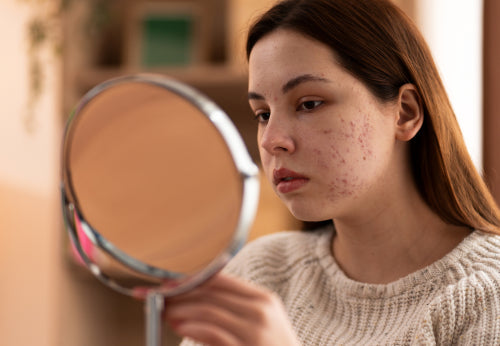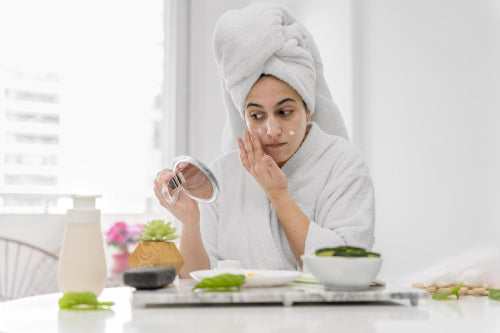The Link Between Stress and Skin Breakouts

Quick Listen:
Stress is an inevitable part of life, but its effects extend far beyond just our emotions and mental well-being. It has a profound impact on our physical health, including our skin. Many people experience skin breakouts, rashes, or irritation when under stress, but what exactly is happening beneath the surface? In this article, we'll explore the physiological connection between stress and skin health, shedding light on why stress often leads to breakouts and how managing it can contribute to healthier skin.
Understanding Stress and Its Impact on the Body
To grasp the link between stress and skin breakouts, it's essential to first understand what stress does to the body. Stress is the body's natural response to perceived threats or challenges, triggering the fight or flight reaction. This response is governed by the release of stress hormones, particularly cortisol, adrenaline, and norepinephrine. These hormones prepare the body to either confront or escape a situation by increasing heart rate, dilating pupils, and directing blood flow to muscles, among other changes.
While this reaction is useful in short bursts, chronic stress such as ongoing work pressure, personal challenges, or constant anxiety can have far-reaching effects on the body, including the skin.
The Hormonal Imbalance Caused by Stress
One of the most significant ways stress affects the skin is through hormonal changes. The body's release of cortisol in response to stress is intended to regulate various functions. However, when cortisol levels remain elevated due to prolonged stress, it can lead to several imbalances that directly affect the skin.
Cortisol plays a crucial role in controlling the production of sebum, an oily substance produced by the sebaceous glands. In response to stress, the body's attempt to regulate sebum production can sometimes result in an overproduction of oil, which can clog pores. This creates an ideal environment for breakouts, especially in areas like the face, back, and shoulders. When the excess oil mixes with dead skin cells and bacteria, it can lead to irritation and visible pimples.
Inflammation and Skin Sensitivity
Stress also causes inflammation throughout the body, and the skin is no exception. When stress triggers the release of certain chemicals, the immune system may become more reactive, leading to increased sensitivity in the skin. The skin may appear red, inflamed, or even aggravated in response to external factors. Inflammatory reactions can exacerbate conditions like acne or other skin sensitivities, causing them to worsen or flare up unexpectedly.
This inflammation isn't just limited to breakouts. People under chronic stress may experience skin dryness, redness, or irritation due to the disruption of the skin's natural barrier. This weakened barrier can leave the skin more vulnerable to environmental aggressors like pollution, allergens, and harsh weather conditions, compounding the effects of stress.
The Role of Sleep and Stress on Skin Health
Sleep is another critical factor in the relationship between stress and skin health. Stress is often associated with sleep disturbances, such as insomnia or disrupted sleep patterns. When we don't get enough quality sleep, our bodies are less able to repair and regenerate skin cells. This means the skin may not recover as effectively from the daily wear and tear it experiences, leaving it more prone to breakouts or other skin issues.
During sleep, the body undergoes processes of repair, renewal, and rejuvenation, including the production of collagen, which is essential for maintaining skin structure. Stress interferes with the body's ability to rest, resulting in the accumulation of skin damage over time. Poor sleep may also cause increased cortisol levels, further aggravating skin concerns.
The Psychological Effects of Stress on Skin
In addition to the physiological effects, the psychological impact of stress can also exacerbate skin issues. Stress often triggers behaviors that are not conducive to maintaining healthy skin, such as excessive touching, picking at breakouts, or neglecting skincare routines. These habits can introduce bacteria to the skin, worsen existing issues, and slow down the healing process.
Stress may also reduce a person's motivation to care for their skin properly. When feeling overwhelmed, people are less likely to invest time and energy in maintaining a skincare regimen, which can result in poor hydration, inadequate cleansing, and an overall lack of care for the skin. This can worsen the effects of stress on the skin.
The Vicious Cycle: Stress and Skin Breakouts
Once stress leads to a breakout, it can create a vicious cycle. People who are stressed may be more likely to develop skin issues like acne, which, in turn, can increase feelings of anxiety, frustration, or self-consciousness. These emotional responses can amplify stress levels, further exacerbating the skin's reaction.
The visibility of skin issues like breakouts can significantly affect a person's confidence, leading to more stress and making it harder to break the cycle. It's important to recognize that managing stress is not only crucial for mental well-being but also for the health and appearance of the skin.
Stress Management: The Key to Clearer Skin
While it's clear that stress plays a significant role in skin health, it's equally important to acknowledge that stress management is a vital tool in improving the appearance and health of the skin. Here are a few strategies that can help:
1. Exercise Regularly
Physical activity is one of the most effective ways to manage stress. Exercise releases endorphins, which are natural mood boosters, helping to alleviate stress and promote relaxation. Regular exercise also promotes healthy blood circulation, ensuring that the skin gets the nutrients it needs for optimal health. Whether it's yoga, walking, or more vigorous workouts, exercise can provide multiple benefits for both mental and skin health.
2. Practice Mindfulness and Meditation
Mindfulness techniques, such as meditation, deep breathing exercises, and progressive muscle relaxation, can help reduce stress levels and restore balance to the body. By incorporating these practices into your routine, you can activate the body's relaxation response, which counteracts the effects of stress and promotes better skin health.
3. Get Enough Sleep
Prioritizing sleep is essential for managing both stress and skin health. Aim for seven to eight hours of restful sleep each night to allow the body to recover, repair, and rejuvenate. Creating a sleep-friendly environment, limiting screen time before bed, and developing a consistent sleep schedule can help improve the quality of your rest.
4. Maintain a Skincare Routine
While managing stress is important, it's also crucial to maintain a consistent skincare routine. Keeping the skin hydrated, clean, and protected from the sun can help minimize the impact of stress-related breakouts. Use gentle skincare products that suit your skin type and avoid over-exfoliating or using harsh chemicals that can further irritate the skin.
5. Seek Support
Don't hesitate to reach out for support when dealing with chronic stress. Whether it's talking to a friend, seeking professional counseling, or participating in support groups, emotional support can help reduce stress and prevent it from negatively impacting your skin. Sharing your feelings can help release emotional tension and foster a healthier mindset.
Proper Skincare
The connection between stress and skin breakouts is complex, involving a combination of hormonal changes, inflammation, and lifestyle factors. While stress is a natural part of life, its effects on the skin can be managed by adopting healthy habits that support both mental and physical well-being. Stress management techniques like exercise, sleep, mindfulness, and proper skincare can help break the cycle of stress-induced breakouts, leading to clearer, healthier skin. By acknowledging the impact of stress on the skin and taking proactive steps to reduce it, you can improve both your overall health and your skin's appearance.
You may also be interested in: Morning vs. Night Routines: Why You Need Both Desavery
Tired of putting harsh chemicals and synthetic ingredients in your skin? Discover the gentle, plant-powered, and cruelty-free skincare routine from Desavery. Meticulously crafted for every skin type, our day-and-night formulas nourish and revitalize, giving your skin a healthy, radiant glow. Join the community of those who've found a natural, effective solution for their skincare needs. Let your glowy skin tell a story of health and natural beauty. Shop Desavery Now!
Powered by flareAI



